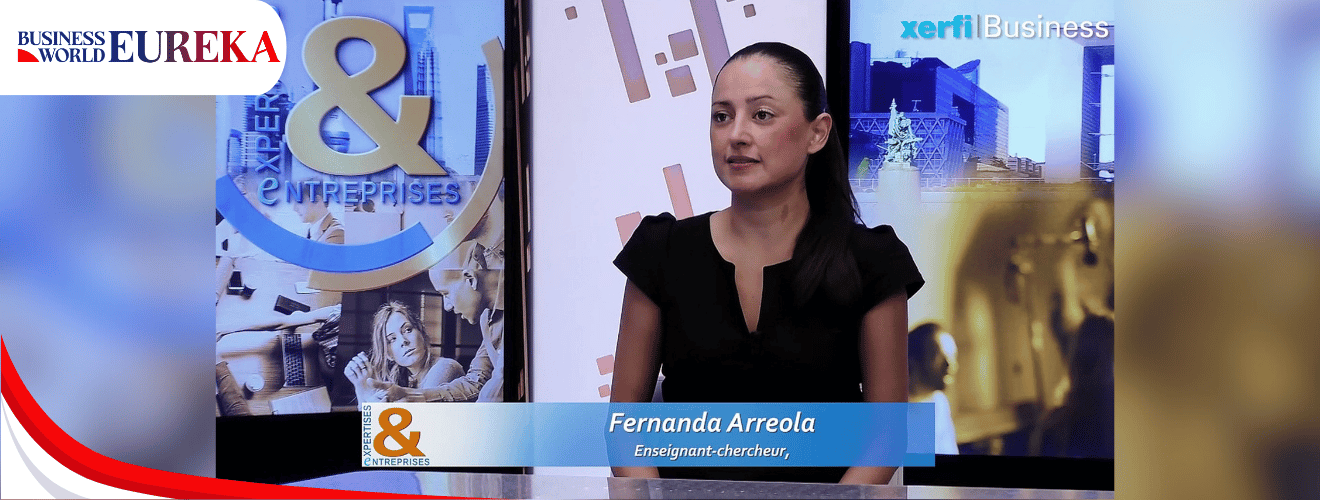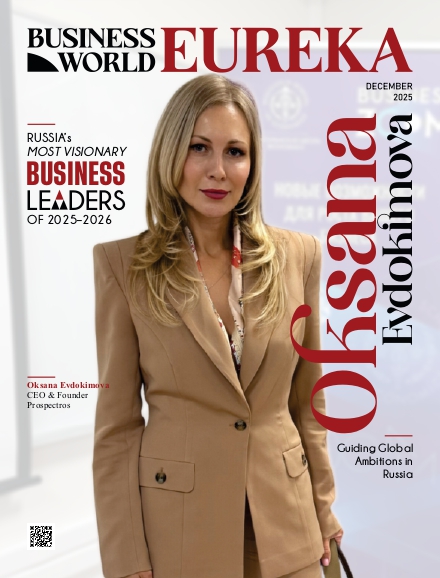Fernanda Arreola: Redefining Entrepreneurship for a Responsible Future

In today’s world, where businesses are constantly tested by rapid technological change, environmental urgency, and shifting societal expectations, the real challenge is not just keeping up; it’s leading responsibly. Many educational institutions still grapple with how to prepare students for this evolving landscape, often caught between theory and the realities of the modern world.
That’s where Fernanda Arreola steps in.
A Professor and Researcher in the fields of strategy, innovation, and entrepreneurship, Fernanda has made it her mission to bridge this gap. At ESSCA School of Management, where she leads entrepreneurial programs, she brings together academic excellence and real-world relevance to shape the leaders of tomorrow.
Her approach is both thoughtful and forward-looking. She believes that entrepreneurship must go beyond profit; it must serve people, society, and the planet. Through a combination of research, program design, and hands-on engagement, she champions themes like sustainability, digitalization, governance, and technological innovation, ensuring they are not just buzzwords but foundational to how students think and act.
Fernanda’s work is rooted in pedagogical innovation. She reimagines learning experiences to be more immersive, reflective, and aligned with today’s global challenges. By doing so, she cultivates an entrepreneurial mindset that values not just what students can build, but how and why they build it.
In forming responsible business leadership, Fernanda is not just preparing students for the future; she’s helping them create it.
Defining Responsible Business Leadership
Fernanda Arreola defines responsible business leadership as a dual commitment: guiding students and entrepreneurs toward discovering purpose in their future roles and nurturing a deeper sense of curiosity that enables them to generate ideas capable of driving sustainable social change. In her role at ESSCA, this perspective shapes how she leads and teaches, ensuring that responsibility and impact remain at the core of business education.
Purpose-Driven Journey
While pursuing her MBA, Fernanda Arreola discovered a calling beyond the corporate world. Professors Mary Sully de Luque and Gregory Unruh recognized her potential and offered her roles as a research and teaching assistant. This experience opened her eyes to the profound influence educators and researchers have on shaping the values and behaviors of current and future managers.
Realizing the power of academia to drive ethical action and societal progress, she made a conscious decision to pivot her career, choosing a path where she could contribute meaningfully to the evolution of society through education.
A Eureka Moment in the Classroom
Fernanda recalls a pivotal moment early in her academic career that shaped her understanding of pedagogical innovation. Shortly after completing her PhD, she began teaching a course on Global Human Resource Management at ESSCA. The course aimed to equip students with the skills needed to become global HR managers while helping them navigate cultural nuances as expatriates. Drawing from her background, having lived in seven countries and worked in four, she began sharing personal experiences alongside academic content.
What struck her was how engaged the students became when real-world insights were brought into the classroom. They were eager to understand how her experiences, and those of other international managers she had encountered, aligned with or challenged what was written in textbooks and academic journals. That was her Eureka moment.
It became clear that students didn’t just want theories; they wanted a dynamic learning experience, one enriched with real-life examples, case studies, media insights, serious games, and practical anecdotes. They were interested in what truly worked in the field, what didn’t, and how recent academic research could be applied in practice. This realization has continued to shape Fernanda’s approach to teaching, embedding pedagogical innovation at the heart of her academic journey.
Bridging Practice and Academia Through Practitioner-Based Research
Fernanda approaches the challenge of aligning research initiatives with global market trends and technological advancements through a methodology known as Practitioner-Based Research (PBR). Inspired by Dr. Gregory Unruh, she values PBR for its ability to transform real-world managerial issues into accessible academic insights. This method allows her to produce work that is not only grounded in current business realities but also useful to both managers and students.
Through PBR, she has explored a wide range of impactful topics, including socially driven ventures like Pixza, innovative strategies from Angel City Football Club, forward-thinking financial practices at Lemonway, evolving HR trends exemplified by Squadify, entrepreneurial narratives like the Van Gogh Roots discovery, and global innovation efforts such as those behind the 2024 Paris Olympics.
Building Meaningful Industry-Academia Collaborations
Fernanda fosters collaboration between educators and industry partners through three consistent practices. She stays informed daily on emerging business trends through news, books, and documentaries. She proactively reaches out to business leaders to initiate and develop collaborative opportunities. Additionally, she actively participates in business gatherings such as international conferences, chamber of commerce meetings, and innovation expos to strengthen these connections.
How International Exposure Fuels Fernanda’s Curiosity and Eye for Innovation
Fernanda credits her international experience with shaping a sharper perspective on innovation and entrepreneurship. Two skills stand out as the most valuable outcomes of her global exposure: an enhanced capacity for observation and a deep, ever-growing curiosity. Constantly on the move, though now more often by train than plane due to environmental concerns, she makes it a point to notice emerging trends, paradoxes, and unique innovations wherever she goes.
From the free public transportation system in Luxembourg to the refined hospitality skills she observed in Saudi Arabia, each journey offers new insights. Among her favorite cultural explorations is visiting local supermarkets. For Fernanda, these everyday spaces are windows into how people live, eat, work, and connect, making them an unexpectedly powerful lens into culture and difference.
Confronting Academic Dishonesty with Integrity
Fernanda reflects on one of the most challenging ethical dilemmas she has faced in her leadership roles, dealing with plagiarism and cheating in the classroom. For her, the response is clear and firm: there should be no tolerance for such behavior. This stance does not stem from a desire to be harsh but from a belief in teaching accountability. Fernanda emphasizes that students must understand that choices carry consequences, especially when those choices compromise integrity.
Balancing Passion with Support: Fernanda Arreola’s Approach to Leadership
Fernanda admits it is not easy to balance the demands of teaching, research, and leadership, especially when one is equally passionate about all three. Her approach is simple but effective: being well-supported. She credits her ability to stay grounded to maintaining a healthy lifestyle and being surrounded by a strong network of family, friends, and a supportive partner who help her recognize when she might be losing that balance.
Key Lessons Learned from Incubators and Entrepreneurship Programs
Fernanda Arreola highlights three essential insights from her work with incubators and entrepreneurship programs. First, she emphasizes the importance of human relationships, how connecting with peers, mentors, coaches, and clients helps entrepreneurs refine their ideas and discover the right direction for growth.
Second, she values the power of artifacts (pretotypes, prototypes, designs, drawings), noting that seeing visible outcomes of their ideas helps entrepreneurs learn more effectively. Lastly, she underscores the significance of failing early, recognizing it as a critical part of the learning and innovation process.
Planting Seeds That Last Beyond the Classroom
Fernanda believes that professors do not “grow trees,” but rather “plant seeds.” For her, the true measure of impact lies not in immediate results, but in the messages she receives from former students and entrepreneurs. These updates often reveal how a specific class or interaction made a lasting, positive difference in their lives, a quiet but meaningful indicator of her influence on both students and the broader community.
The Influence Behind Fernanda Arreola’s Leadership Approach
Fernanda Arreola believes her most significant leadership growth has come during her past two years at ESSCA. In this role, she has developed a more balanced and mature approach to collaboration, teaching, and research.
While she considers these professional experiences important, it is her mother’s career that remains a constant source of influence, shaping her views on leadership, family, and well-being every day.
Paving New Pathways in Global Education and Innovation
Fernanda shares her forward-looking vision with clarity and intent. She aims to continue building new partnerships that enable visiting scholars to engage with their institution, fostering rich academic exchanges.
Additionally, she remains committed to driving research in collaboration with business leaders worldwide, an approach that strengthens both internationalization and responsible innovation in education.
Explore more insightful articles, interviews, industry news, and business magazines on our website. Click here to stay informed and inspired!
Latest Editions
-
 World's Most Inspiring Keynote Speakers to Watch in 2025–2602 Jan 2026 magazines
World's Most Inspiring Keynote Speakers to Watch in 2025–2602 Jan 2026 magazines -
 Russia’s Most Visionary Business Leaders of 2025–202619 Dec 2025 magazines
Russia’s Most Visionary Business Leaders of 2025–202619 Dec 2025 magazines -
 Sheroes: UK's Most Visionary Leader Making Their Mark in the Global Education Landscape, 2025–2602 Dec 2025 magazines
Sheroes: UK's Most Visionary Leader Making Their Mark in the Global Education Landscape, 2025–2602 Dec 2025 magazines -
 Europe’s Most Influential Business Leaders to Watch in 2025-2630 Nov 2025 magazines
Europe’s Most Influential Business Leaders to Watch in 2025-2630 Nov 2025 magazines -
 UK's Most Influential Personalities to Follow in 202504 Nov 2025 magazines
UK's Most Influential Personalities to Follow in 202504 Nov 2025 magazines

